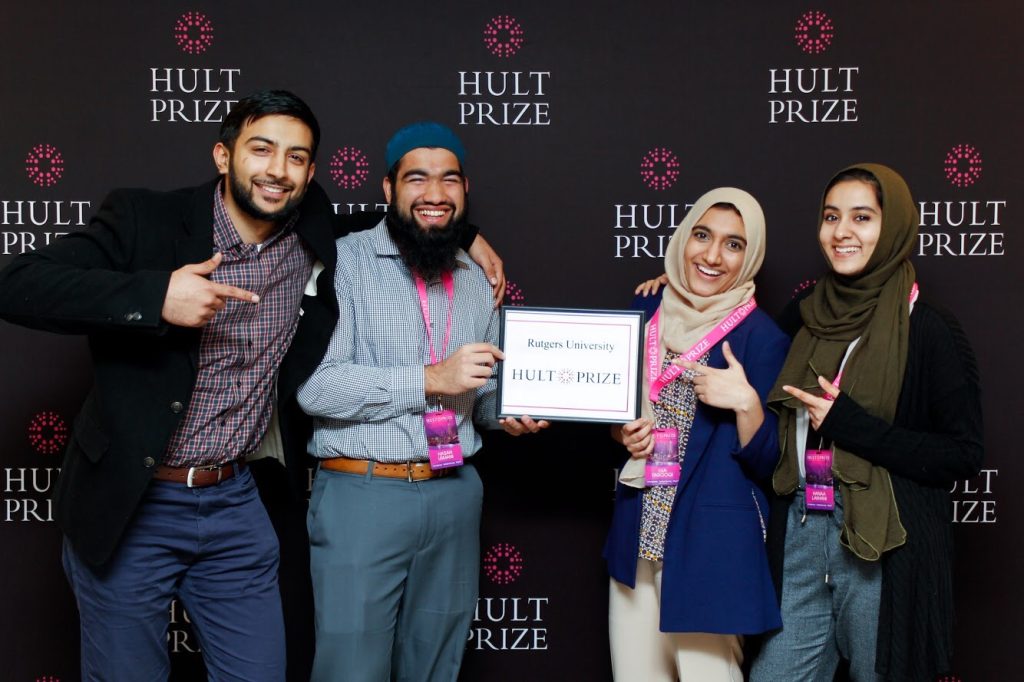If you’re in business, you’ve probably learned by now that the more things change, the more you must adapt and learn alongside them. Perhaps there’s no better career path to teach you the importance of adaptability than entrepreneurship. I know because I’ve walked this path before entering my role as a management consultant — but that path isn’t one I had anticipated taking. It fell into my lap when I won the prestigious Hult Prize that awarded three other co-founders and me $1 Million in seed money.

The $1 Million Prize Money That Kickstarted It All
In 2017, I shifted course as I was preparing to graduate from Rutgers Business School and say yes to a full-time job offer. Three friends and I chose to compete in a global case competition about social entrepreneurship. Together, we developed an idea that hit the triple bottom line requirement for the competition — profitability, sustainability, and impact.
The competition’s theme was the refugee crisis, and we were tasked with creating a business idea that would help others experiencing displacement due to poverty or political climate. While we are all from America, we have ethnic roots in Pakistan. In Pakistan, we saw a huge population of women who had skills to offer the job market but did not have the transportation to get to their jobs to perform their duties. As such, 89% of Pakistani women didn’t take jobs that required commuting simply because they couldn’t safely get to work. In the case competition, we presented a ride-sharing app that would connect these women with their places of work so they could get employment and safely get to their jobs daily.
The judges liked our pitch, and we won $1 million to start our idea: Roshni Rides.
Upon graduation, I married, moved to a new country, and launched Roshni Rides in Pakistan. In the beginning, things were moving successfully. Things suddenly turned as we were gearing up for our next investment round in early 2020. Covid hit, and the government shut down all forms of transportation, including ride-sharing. As such, we were forced to shut down the app. After spending several months helping find our employees new jobs, my family and I returned to the United States, and I entered the world of management consulting with Blue Skies Consulting.
These things helped me in my entrepreneurial world yesterday and continue to help me in my consulting world today. I’m sharing them here so you can see how they can help you in your leadership roles too.
Effectiveness: The Art of Getting Stuff Done
When I started as an entrepreneur, I didn’t fully grasp what it meant to operate effectively. It wasn’t until one of my mentors, the COO of Indus Hospital, a fully non-profit hospital in Pakistan, got together after a workout one day. I admired his role and asked him, “What is the most important part of being a leader?” His answer — be effective.
While running Roshni Rides, I discovered what he meant by this. The best things often come from starting and iterating. Our business was an app and web-based. Initially, we knew that we needed a high volume of riders to recoup our costs. To generate cash flow quickly, we leveraged a manual process to be more effective. That process allowed us to build momentum and bring in money faster. For example, until we could automate the process of tracking drivers to routes, I would manually pinpoint where drivers should pick up the women who needed a ride to work.
In entrepreneurship, nothing is done for you. To be successful, your bias must be towards action and a unique tenacity to make sure tasks move forward. It’s all about getting stuff done, no matter how it gets done.
In consulting, that same attitude applies. Clients don’t always outline exactly what they need from you. Instead, they will give you the symptoms of a problem and rely on you to diagnose the root cause. For example, if a client’s manufacturing line is not meeting its yield objectives, they rely on the consultant to dig deeper and effectively work to analyze the root cause of the problem.
Out-of-the-box thinking allows entrepreneurs to rise more effectively to the job of consulting.
Empathy: The Ability to Understand Leadership at a Deeper Level
One of the most stressful parts of my college experience wasn’t the learning or the doing — it was the job interviews. I used to get overwhelmed thinking about interviews, harping on things I thought were a big deal to the person on the other side of the conversation.
It wasn’t until I was the interviewer that I realized the things I was worried about weren’t that big of a deal most of the time. Instead, from the perspective of the interviewer and a leader, I realized it wasn’t their experience level that mattered most, rather it was their likability and effectiveness that was assessed as a foundation to enable their success.
Entrepreneurs are thrust into a leadership role as teams grow. That leadership role shifts perspective on the decisions and actions of leaders. It gives first-hand experience in the operations and thought process of leadership. That insight allows past leaders to become better future followers because there’s empathy baked inside their role.
When I started working in management consulting, I knew I was going to join the company as a more junior resource. Having hired junior resources for my own teams, I knew what employers were looking for. Because of that empathetic approach to leadership, other entrepreneur-minded team members and I can tailor our skillset to what’s needed for each project. This approach helps break teams out of siloed thinking and into more valuable roles.
Execution: The Conscious Act of Prioritization
In any business or project, a big-picture goal must be accomplished. In entrepreneurship, that big-picture goal encompasses every aspect of the business, from HR and operations to marketing and sales. In consulting, you’re juggling many tasks against a large project goal.
When I oversaw operations at Roshni Rides, I was responsible for everything under the sun. Twenty-four hours a day wasn’t enough for what I wanted to accomplish. At one point, we ran 20 routes and only had one operations manager, plus myself. We oversaw all the routes, recruited drivers, and handled complaints. At this juncture, I had to decide whether to put in the extra work or prioritize hiring someone else for the role so I could put my energy and expertise toward a higher-priority task. I chose to hire help to backfill my duties so that I could focus more on creating additional routes and helping with the app development. This resulted in our routes growing 5X in about one year, from 20 routes to 100 routes.
The same perspective and aptitude for prioritization apply to any major project. Dedicated team members are highly vested in the projects they take on, which often means their work extends beyond their job description or scope. Being able to zoom out and see the big picture and simultaneously zoom in to see the smaller details allows team members to hone in on what needs to get done to reach the project goals on time. This prioritization is what creates excellence in project outcomes.
Ultimately, adaptability and the ability to work under constraints are necessary for both roles. Whether you’re an entrepreneur or a management consultant, being effective, empathizing with leadership, and executing the right tasks will equip you to achieve the outcomes necessary to thrive in your role.
Share:


